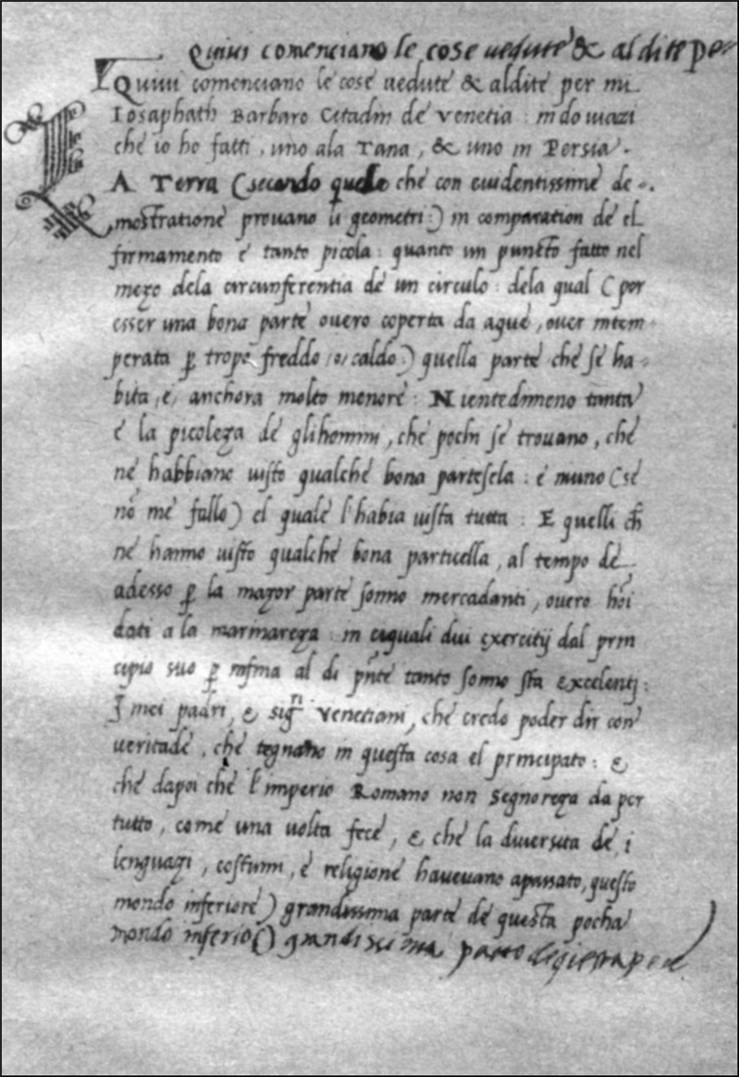Giosafat Barbaro Biography
Giosafat Barbaro (1413–1494) was one of the most famous explorers, diplomats, merchants and travel writers of the 15th century, managing to travel across the all territories that were under the influence of both Venetian state and his Barbaro family that managed to produce many notable members who were involved in church, diplomacy, arts, military, philosophy and science. The most important parts of his life were when he visited Greek colony and city of Tana on the delta of Don river that is part of modern Russia, ambassador to Persia and numerous books in which he told the tales he collected on his journeys.
Giosafat Barbaro (also known under the name Giosaphat and Josaphat) was born Campo di Santa Maria Formosa in 1413 as the son of Antonio and Franceschina Barbaro. Little is known about his early life before he became member of the Venetian state in 1431, and when he married with Nona Duodo with whom he had three children. Between 1436 and 1452 he spent his time in Genoese colony Tana, where he served as a merchant and a diplomat. During his stay there he recorded many events, including his expedition to the supposed burial mound of the last King of the Alans. He managed to find its location, but he did not find any riches there (modern historians believe he discovered buried kitchen midden). Some of his most notable diplomatic and military exploits from that time were successful mission in which he persuaded Tartars not to attack Tana, fights against Circassian raiders, and securing of diplomatic relations with several cities in the regions including Solcati, Soldaia, Cembalo, Caffa and Russian Novogorod. In 1452 Venetian traders left the area of Crimea because of Ottoman Turks’ advance with trading services.
After that time, Giosafat Barbaro became more involved in politics and he secured from Venetian stete ruling position in Albania where he started to clash with Turk forces. By 1471, after unsuccessful attempt to secure the help of Persia in the fight against the Turks, Venetian state managed to get the support of Papal States, the Kingdom of Cyprus and the Knights of Rhodes. In 1472, Giosafat Barbaro was elected to become the Venetian ambassador to Persia, but his arrival to that country was delayed by his long stay in Cyprus where he was involved in significant political and military battles. When he arrived in Persia at last, Venetian state already dispatched his replacement, and in the same time, death of Persian leader Uzun Hassan caused significant internal struggles with his sons fighting for the throne. Giosafat Barbaro was then forced to flee from Persia, hiring the help of Armenian guide who led him from Persia to Erzerum, Aleppo, and Beirut until he finally managed to return to Venice in 1479. At home he was met with strong opposition who accused him of taking too much time to reach Persia, but he managed to hold his position and was elected in following years into several more positions of notice, including Captain of Rovigo, Provveditore of all Polesine, and one of the councilors of Doge Agostino Barbarigo, chief magistrate of Venice.
Giosafat Barbaro died in 1494 and was buried in the church of San Francesco della Vigna in Venice.
| Name | Giosafat Barbaro |
| Born | 1413 |
| Place of Birth | Venice, Italy |
| Died | 1494 |
| Place of Death | Venice, Italy |
| Category (Occupation/Profession) | Diplomat, merchant, explorer and travel writer |
| Nationality | Italian |
| Religion | Catholic |
| Famous Expedition(s) | Travels to Tana |
| Notable Work(s) | Fiaggi falti da Fenezia alla Tana in Persi |
| Spouse(s) | Nona Duodo |
| Children | Giovanni Antonio |
| Parent(s) | Antonio Barbaro, Franceschina Barbaro |
